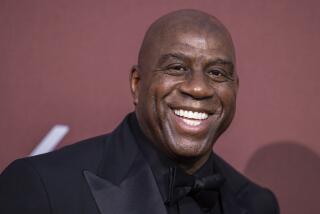Ex-Laker’s a Team Player for Charity
- Share via
The news was a devastating body blow: Earvin “Magic” Johnson was retiring from the Lakers because he had contracted the virus that causes AIDS.
Stunned fans did not want to believe that Magic, who had bathed admirers in his luminescent smile while bringing “Showtime” to the Lakers, had fallen prey to a disease that was all too often still discussed in whispers in 1991.
Magic, though, joined the growing chorus of those who spoke loudly and clearly: “We don’t have to run from it,” he said of HIV.
And Johnson, who seems to prosper in the face of daunting odds, went on the offensive. The day after he announced that he was infected, he went on national television to discuss his illness and urge viewers to practice safe sex.
Shortly afterward, he started his Magic Johnson Foundation with HIV/AIDS as its initial target. The foundation, which has raised $15 million for charity, has since expanded its scope to include a range of concerns while developing programs to improve health, education and social services in low-income communities.
After he went public with his illness, health clinics and AIDS hotlines around the country were swamped with calls from people requesting HIV tests and seeking information about the disease.
If HIV could hit Magic, it could hit anyone, Americans--especially young people--began to realize, and the basketball star’s illness brought attention that resulted in more research dollars, more clinics, more discussion of the disease.
*
HIV had no more success containing Johnson than bewildered defenders had trying to guess the target of his no-look passes.
One July weekend finds him hosting more than 1,000 children at the Willowbrook recreation center named for him at his annual “Midsummer Night’s Magic Weekend,” where youngsters rub shoulders with their idol and see their National Basketball Assn. favorites in an all-star game that raises money for high school and college students.
Weeks later, he is in a Santa Monica fashion show that has raised millions of dollars to combat HIV/AIDS--$100,000 coming this year from two guests who bid $50,000 each to play Johnson one-on-one at L.A.’s new Staples Center.
Earlier, he hosted the “Magic Bowl” in Miami, a celebrity charitable basketball game that benefits a home for children with AIDS and other medical problems.
Johnson cannot escape his passion for basketball, nor does he want to, and he moves in a blur of controlled motion reminiscent of his dissection of opposing defenses.
He leads a fast break against breast cancer with a national initiative launched in April to educate women about prevention, detection and treatment.
He runs a pick and roll on asthma through a program called BREATHE, Bringing Education on Asthma to Homes Everywhere, which stresses prevention and treatment. The program includes bilingual educational materials and an interactive Web site (https://www.breatheinfo.com).
His foundation has also teamed with health professionals to create videos to help communities learn more about asthma, immunizations, HIV, and childhood illnesses.
*
When he was first diagnosed, Johnson was advised to slow down and avoid stressful situations because his immune system could be impaired if he did not. He slowed down--for about a minute.
His breakneck pace has not taken a toll, though. Johnson’s physicians have reported that drug therapy has reduced the presence of HIV in his blood to undetectable levels. Even before he was diagnosed with HIV, he had begun to test the waters in the great pool of American commerce. His corporate involvements now are formidable.
His Magic Johnson Theatres--a joint venture with Sony Theaters--have become a landmark in the Crenshaw District; screens are going up in other cities. He has become a joint-venture partner with Starbucks Coffee. And he joined singer Janet Jackson and record industry executive Jheryl Busby in buying a majority stake worth $3 million in L.A.-based Founders National Bank.
The only major stumbles in his string of successes are his ill-fated venture into late-night television and a foundering $140-million proposal to develop the Santa Barbara Plaza in the Crenshaw District.
His successes and his broadened health agenda, though, have not dimmed his concern about HIV/AIDS. HIV is still the second leading cause of death for Americans between 25 and 44, says, Johnson, who is 40, and it is the leading cause of death for African American men and women in that age group.
Moreover, he says, estimates are that half of all new HIV infections in the U.S. are among people under 25, and the majority contract the infection sexually.
Clearly, more prevention programs are needed for high-risk groups. “We’ll fight fearlessly to do better,” Johnson says.
*
Johnson is a keynote speaker Sunday at noon at The Times Festival of Health at USC.
More to Read
All things Lakers, all the time.
Get all the Lakers news you need in Dan Woike's weekly newsletter.
You may occasionally receive promotional content from the Los Angeles Times.






